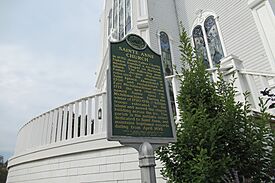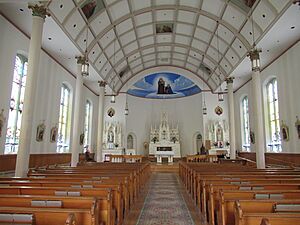Sainte Anne Church (Mackinac Island) facts for kids
Quick facts for kids Sainte Anne Church |
|
|---|---|
| Ste. Anne Catholic Church | |

Image of the church in October 2023
|
|
| 45°51′01″N 84°36′41″W / 45.8504°N 84.6114°W | |
| Country | United States |
| Denomination | Roman Catholic |
| History | |
| Founded | 1670 (356 years ago) |
| Founder(s) | Claude Dablon |
| Architecture | |
| Years built | 1874 (152 years ago) |
| Administration | |
| Diocese | Diocese of Marquette |
|
Sainte Anne Church
|
|
|
U.S. National Historic Landmark District
Contributing Property |
|
 |
|
| Part of | Mackinac Island (ID66000397) |
|---|---|
| Significant dates | |
| Designated NHLDCP | October 15, 1966 |
Sainte Anne Church is a Roman Catholic church located on Mackinac Island in the U.S. state of Michigan. It is a very old church with a long history.
The first church was started by a missionary named Claude Dablon in 1670. The oldest church records are from 1695. Over the years, the church building moved several times. It moved from Fort de Buade to Fort Michilimackinac in 1708. Then, it moved again from Fort Michilimackinac to Mackinac Island in 1781. For many years, the church used an old building made of logs. The current church building was built in 1874 on land given by a kind fur trader named Magdelaine Laframboise. On December 20, 1990, the church was recognized as an important historical place in Michigan.
Contents
History of Sainte Anne Church
Early Jesuit Mission
The church began as a mission run by the Society of Jesus, also known as the Jesuits. These priests served at Fort de Buade (now St. Ignace) and later at Fort Michilimackinac (now Mackinaw City).
Around the 1740s, the connection to the Jesuits became weaker. Many of the Odawa (Ottawa) people, who were a main focus of the mission, moved away. They left the sandy area around Fort Michilimackinac to find better farming land along the Lake Michigan coast. Cross Village grew from their main village. The church at Fort Michilimackinac then mostly served people who traveled a lot, like fur traders and voyageurs (French-Canadian boatmen). These travelers often looked to Saint Anne as their special protector, so the church became more connected to her.
In 1765, the Jesuit Order was no longer able to send priests to the area. Regular church members, many of them women, worked hard to keep the church going. Even though it was unusual for regular members to lead the church, the Church accepted it because of their strong faith. They even kept a living space ready for a priest, even when there wasn't one. During this time, the church building was taken apart and moved from Fort Michilimackinac to Mackinac Island in 1780–1781. This was done because the British government ordered it.
The American Frontier Era
In 1796, Mackinac Island and its church became part of the United States after a treaty with Great Britain. The island was a busy new town that grew because of fur trading. More Americans came to the island.
However, the new American military leaders didn't pay much attention to the Catholic faith. This caused the church's leadership by regular members to fall apart for a while. In 1803, a priest named Father Gabriel Richard visited the church. He found that the altar was not being respected, and the priest's living area was being used for other purposes not related to the church.
After the War of 1812, a well-known local fur trader named Madeline La Framboise helped save the church. She was an Ojibwe woman who worked with visiting priests to make the church a proper place of worship again. She also gave land for the church to be built on.
As more people settled in Michigan, the Catholic Church set up a more organized system for worship. In 1830, Father Samuel Charles Mazzuchelli became the first resident priest at Sainte Anne de Michilimackinac in 65 years. In 1853, the church became part of what is now the Diocese of Marquette. As the population and economy grew, the old log church was taken down in the 1870s. A new church, made of timber, was started in 1874 and finished in the 1880s. This is the church building still used today.
Sainte Anne Church Today
As the 300th anniversary of the church's records approached, Sainte Anne Church was recognized as a Michigan historic site in 1992. A special historical marker was placed at the church.
Sainte Anne Church is one of the oldest Roman Catholic churches in the middle of North America. This is known because its church records have been kept continuously for over 330 years. There is also a museum on the ground floor of the church. It shows and explains items from the church's long history.
 | James B. Knighten |
 | Azellia White |
 | Willa Brown |


